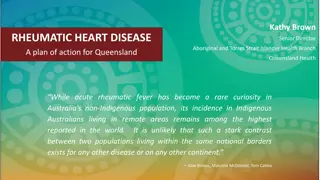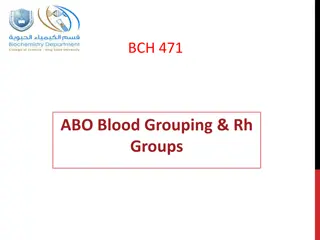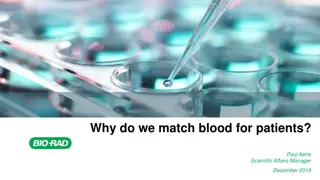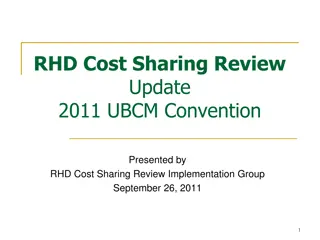Fleet Management Overview
This sensitive commercial information outlines the comprehensive management of a large postal vehicle fleet, including strategic support, maintenance facilities, acquisition strategies, logistics, and more. The document also introduces a new VP organization focusing on fleet management and electrifi
0 views • 11 slides
Understanding Human Blood Groups and Genetics
Human blood groups are determined by the presence or absence of specific antigens and antibodies. The ABO system categorizes blood into four types (A, B, AB, O), while the Rh factor (D antigen) determines whether blood is RhD positive or negative. Blood group antigens are crucial for safe transfusio
2 views • 14 slides
Understanding Acute Rheumatic Fever: Causes, Symptoms, and Impact
Acute Rheumatic Fever (ARF) is a multisystem disease resulting from an autoimmune response to a sore throat caused by Group A beta-hemolytic Streptococci. It primarily affects children aged 5-14 years and can lead to rheumatic heart disease (RHD), which is the most common cause of heart disease in c
2 views • 48 slides
Understanding Blood Groups and Their Significance
Human blood types are determined by specific antigens and antibodies present on red blood cells, influencing crucial aspects like blood transfusions and familial relationships in forensic medicine. The ABO system, with its four main blood types (A, B, AB, O), plays a vital role in categorizing blood
7 views • 14 slides
Addressing Rheumatic Heart Disease Disparities in Indigenous Australians
Rheumatic heart disease (RHD) continues to disproportionately affect Indigenous Australians, particularly those living in remote areas, with a high incidence compared to the non-Indigenous population. Acute Rheumatic Fever (ARF) is a key precursor to RHD, often linked to social determinants and poor
0 views • 7 slides
Understanding ABO Blood Grouping and Rh Groups
ABO blood grouping and Rh factor testing are crucial for blood transfusions and forensic medicine. The presence or absence of specific antigens and antibodies in human blood determines blood type. Genetic inheritance from parents establishes blood type, with codominance influencing offspring phenoty
0 views • 13 slides
Why Do We Match Blood for Patients?
Blood matching for patients is crucial to prevent adverse reactions like hemolysis and death. ABO and RhD compatibility testing are fundamental, along with selecting antigen-negative units for patients with clinically significant antibodies. Beyond mandatory requirements, matching can be complex due
0 views • 9 slides
RHD Cost Sharing Review Update 2010: Capital Planning Horizons and Funding Strategies
The RHD Cost Sharing Review Update in 2010 focuses on the status of implementing recommendations from previous reviews regarding capital planning and funding cycles for health authorities and Regional Hospital Districts. It discusses the impact of economic conditions on capital funding, availability
0 views • 11 slides
RHD Cost Sharing Review Update 2011 - UBCM Convention Insights
Background review of the RHD Cost Sharing Review's 2008 report, progress updates from 2009 & 2010 Conventions, and actionable recommendations from the 2008 Cost Sharing Review. Recommendations include long-range capital planning, fixed funding amounts definition, P3 educational materials development
0 views • 27 slides








